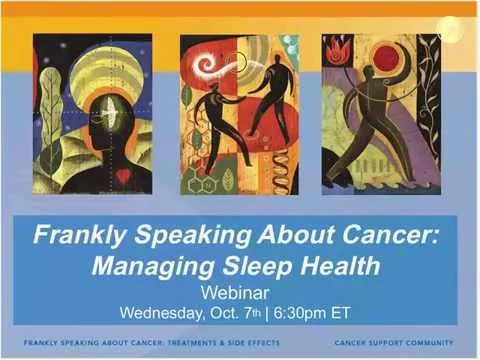Getting enough rest is an important part of staying healthy. People with cancer often report problems with getting the right amount of sleep. Some people find that they are sleeping much more than usual. Other people share that they suffer from insomnia which is the inability to get enough sleep to feel rested. Excessive sleep, too little sleep, restlessness and increased dream activity or nightmares can significantly affect your ability to feel well and to cope with daily activities. For some people going through cancer treatment, disruption in sleep can be one of the most distressing side effects they face. Feeling too tired or fatigued from cancer treatment and having sleep problems sometimes go hand in hand. Please talk with your doctor if you are upset or feeling affected by changes in your sleep patterns. There are treatments and support services that can help with sleep problems.
There are three main ways sleep can interfere with your life:
- Hypersomnia: You sleep for long periods of time (10 or more hours at a time), have trouble staying awake during the day or constantly feel tired, even after a nap.
- Insomnia: You struggle to fall asleep or stay asleep.
- Nightmares: Your sleep is disrupted by scary, vivid dreams that feel real.
All three of these conditions can make it harder to function during the day, and may worsen other side effects or health concerns. Try these tips to help manage sleep problems.
Coping with Hypersomnia
- Try to exercise every day, preferably in the morning or early afternoon. Develop a sleep routine so that you go to bed and wake up at the same time every day. When it is time to get up, get out of bed.
- Avoid naps. If needed, adjust your regular bedtime or wake-up time to give yourself extra sleep time.
- Spend time on activities you enjoy that take your full attention.
- Watch your diet. Avoid eating heavy foods or meals that might make you feel drowsy during the day.
- Avoid alcohol and caffeine.
Coping with Insomnia
- Work with your health care team to address underlying sources of insomnia, such as pain, anxiety or medication.
- Develop a sleep routine. Go to bed and wake up at the same time each day.
- Start a bedtime ritual, such as reading or taking a bath, to signal to your body that it is time for sleep.
- Avoid caffeine, alcohol and tobacco, especially at night.
- If you are hungry at bedtime, eat a light snack.
- Exercise regularly, preferably more than two to three hours before bedtime.
- Sleep in a quiet, dark room that is not too hot or cold.
- Medications are sometimes used to treat insomnia in the short-term if other approaches do not work.
Coping with Nightmares
- Discuss your fears and feelings with a close friend or family member. Have these conversations early in the day rather than the evening.
- Talk about the nightmares with a trusted family member or friend.
- Write in a diary or draw pictures to express the content or themes of the nightmares.
- Imagine different endings or story lines to the nightmares.
- Remind yourself that nightmares aren’t real.
